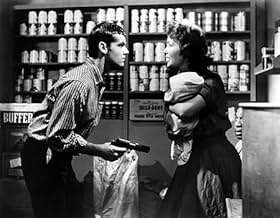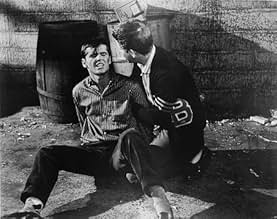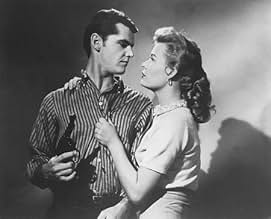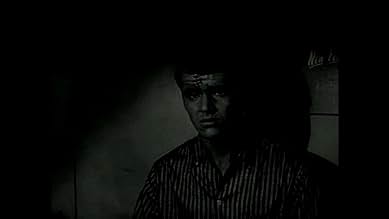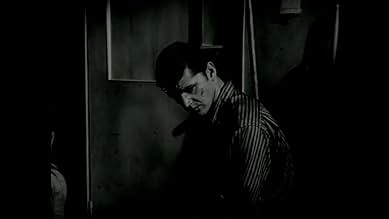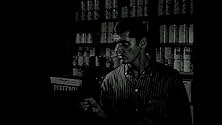Ajouter une intrigue dans votre langueA teenage boy panics and takes hostages when he thinks he's committed murder.A teenage boy panics and takes hostages when he thinks he's committed murder.A teenage boy panics and takes hostages when he thinks he's committed murder.
Smoki Whitfield
- Sam
- (as Jordan 'Smoki' Whitfield)
Roger Corman
- Joe - TV Truck Man
- (uncredited)
Leo Gordon
- Man in Crowd
- (uncredited)
Avis en vedette
"The Cry Baby Killer" (1958) is at best a very mediocre film.
It revolves around 17-year-old Jimmy Wallace who is brutally beaten by a gangster and two of his teen-age punk friends, because one of them wants to move in on Jimmy's girl, Carole. Later, Jimmy shows up at the hangout of the teenage crowd to take Carole away, and challenges one of them , Manny, to a fight. Manny's two buddies move in with brass knuckles, and one of them pulls a pistol, which falls to the ground in the scuffle. Jimmy picks it up and shoots Manny and Al. A police officer orders Jimmy to surrender, but he panics, thinking he killed the pair, and dives into a small storeroom, and holds a man, woman and her baby as hostages.
The premise itself is intriguing but the film simply doesn't deliver in terms of either emotional weight or production value. It is poorly conceived, directed and not the best of films. However, this is Jack Nicholson's feature debut film, and as he would become notorious for in his career, he is nailing every second of his time on screen. Recommended only for film enthusiasts and fans of Jack Nicholson.
It revolves around 17-year-old Jimmy Wallace who is brutally beaten by a gangster and two of his teen-age punk friends, because one of them wants to move in on Jimmy's girl, Carole. Later, Jimmy shows up at the hangout of the teenage crowd to take Carole away, and challenges one of them , Manny, to a fight. Manny's two buddies move in with brass knuckles, and one of them pulls a pistol, which falls to the ground in the scuffle. Jimmy picks it up and shoots Manny and Al. A police officer orders Jimmy to surrender, but he panics, thinking he killed the pair, and dives into a small storeroom, and holds a man, woman and her baby as hostages.
The premise itself is intriguing but the film simply doesn't deliver in terms of either emotional weight or production value. It is poorly conceived, directed and not the best of films. However, this is Jack Nicholson's feature debut film, and as he would become notorious for in his career, he is nailing every second of his time on screen. Recommended only for film enthusiasts and fans of Jack Nicholson.
This is a movie that you can watch despite its non existent scenario and dialogs, because it is well paced and producer Roger Corman, in an early effort, makes every dollar count in production value.
But of course one checks it out because it is Jack Nicholson's debut movie. And yes, one already didn't have Jack Nicholson's voice, and yes, one already didn't have Jack Nicholson's face, but, yes, one could have easily acted as badly as Jack Nicholson then. Knowing what was to come next, this makes it worth an idle glance.
But of course one checks it out because it is Jack Nicholson's debut movie. And yes, one already didn't have Jack Nicholson's voice, and yes, one already didn't have Jack Nicholson's face, but, yes, one could have easily acted as badly as Jack Nicholson then. Knowing what was to come next, this makes it worth an idle glance.
I actually had and read a vintage copy of the movie tie-in novelization (it wasn't a pre-existing novel), and faintly remember it being not-bad--at least it suggested the movie might be a nice little j.d. Thriller. Yet the film turned out to be surprisingly hard to see, so I didn't until just now. And it was a disappointment.
Yes, there's the curiosity value of seeing Nicholson in his debut role, and he's OK. But a decent story premise is poorly handled by the director (who did a whole lot of TV episodes, but this remained his sole theatrical feature), with little control over pacing, tone, the intended social critique, tension, a consistent level of acting, etc. Roger Corman apparently was disappointed too, because the film was a commercial failure (he'd never had one before), and he felt while he was busy with other things some of the more immediate participants made changes that weakened its potential.
It's a low-budget stab at something like "Ace in the Hole" or "Dog Day Afternoon," an indictment of police, press and public response to a crisis that could have been quietly defused rather than recklessly blown into a circus. But the moralizing point is confused, and the movie settles for halfhearted stereotypes and an air of watered-down sensationalism. It doesn't even have the vigor or vulgarity to be good drive-in trash. The music is often inappropriate (we get cocktail-lounge sounds when we're supposed to be wracked with suspense), and the title song is awful.
Nicholson tries to give a real performance, and some of the actors are OK as well, but the film undermines them by not seeming to trust its material--it seems to vaguely disdain this story, without having the wit to make fun of it, or the tangible smarts to suggest the makers are actually "better than this." Actually, they're worse--"Cry Baby Killer" could have been a neat little intersection of "Rebel Without a Cause" and "The Sadist," but instead it's just a poorly made programmer with curiosity value because a future legend is in it.
Yes, there's the curiosity value of seeing Nicholson in his debut role, and he's OK. But a decent story premise is poorly handled by the director (who did a whole lot of TV episodes, but this remained his sole theatrical feature), with little control over pacing, tone, the intended social critique, tension, a consistent level of acting, etc. Roger Corman apparently was disappointed too, because the film was a commercial failure (he'd never had one before), and he felt while he was busy with other things some of the more immediate participants made changes that weakened its potential.
It's a low-budget stab at something like "Ace in the Hole" or "Dog Day Afternoon," an indictment of police, press and public response to a crisis that could have been quietly defused rather than recklessly blown into a circus. But the moralizing point is confused, and the movie settles for halfhearted stereotypes and an air of watered-down sensationalism. It doesn't even have the vigor or vulgarity to be good drive-in trash. The music is often inappropriate (we get cocktail-lounge sounds when we're supposed to be wracked with suspense), and the title song is awful.
Nicholson tries to give a real performance, and some of the actors are OK as well, but the film undermines them by not seeming to trust its material--it seems to vaguely disdain this story, without having the wit to make fun of it, or the tangible smarts to suggest the makers are actually "better than this." Actually, they're worse--"Cry Baby Killer" could have been a neat little intersection of "Rebel Without a Cause" and "The Sadist," but instead it's just a poorly made programmer with curiosity value because a future legend is in it.
Jack Nicholson made his debut on the big screen with this acceptable thriller from the series B, subsection youth and violence, produced by Roger Corman, in which he shares the cast with Carolyn Mitchell, a beautiful and young actress totally forgotten, who shortly after the end of filming would become nothing more and nothing less than the fourth wife of Mickey Rooney before passing away tragically.
Virtually the entire career of the director, Jus Addiss, was focused on television, and that is something that shows for good in the planning and staging of the film, with a sustained rhythm and without ups and downs. The youthful story of love, jealousy and violence in which Nicholson takes refuge in a small grocery store armed with a gun and with hostages is nothing to write home about and even focuses more on what happens around those hours than in the Nicholson himself, who in his performance already accurately outlines some of the grimaces of a patient with hemorrhoids that later made him famous. But the movie, I already said, is quite effective and has its charm, especially in the opening sequences in the dive where Mitchell and the badass thug for which she has left Nicholson (Brett Hasley) are whisteling sweet nothings surrounded of some other guys.
Without lacking from a sociological point of view, although seasoned with humor, the usual morality of the B-series movies of the time that deal with the subject of youth and delinquency, another of its assets is the elegant and beautiful presence as a secondary role of Lynn Cartwright, a lady who would later have a long career in projects of a different kind. Among the presences that one cannot fail to notice in the large casting there is also, although it does not even appear in the credits, the always friendly and usual characteristic of the Corman gang at that time, Bruno VeSota, a guy who always gives a consistent looking to the shots and that, as director, that same year he had done for the "The Brain Eaters". As with Corman everyone did everything, may be someone told him to stay and gave him a phrase so that the tape in its final section would not decay.
In the same way that in moments of tension, the soundtrack resorts to more sandunguero Latin jazz, in the vein of Gillespie's Latinbop, so that things do not go downhill. Those are the kind of things that are appreciated in this type of cinema.
Virtually the entire career of the director, Jus Addiss, was focused on television, and that is something that shows for good in the planning and staging of the film, with a sustained rhythm and without ups and downs. The youthful story of love, jealousy and violence in which Nicholson takes refuge in a small grocery store armed with a gun and with hostages is nothing to write home about and even focuses more on what happens around those hours than in the Nicholson himself, who in his performance already accurately outlines some of the grimaces of a patient with hemorrhoids that later made him famous. But the movie, I already said, is quite effective and has its charm, especially in the opening sequences in the dive where Mitchell and the badass thug for which she has left Nicholson (Brett Hasley) are whisteling sweet nothings surrounded of some other guys.
Without lacking from a sociological point of view, although seasoned with humor, the usual morality of the B-series movies of the time that deal with the subject of youth and delinquency, another of its assets is the elegant and beautiful presence as a secondary role of Lynn Cartwright, a lady who would later have a long career in projects of a different kind. Among the presences that one cannot fail to notice in the large casting there is also, although it does not even appear in the credits, the always friendly and usual characteristic of the Corman gang at that time, Bruno VeSota, a guy who always gives a consistent looking to the shots and that, as director, that same year he had done for the "The Brain Eaters". As with Corman everyone did everything, may be someone told him to stay and gave him a phrase so that the tape in its final section would not decay.
In the same way that in moments of tension, the soundtrack resorts to more sandunguero Latin jazz, in the vein of Gillespie's Latinbop, so that things do not go downhill. Those are the kind of things that are appreciated in this type of cinema.
You'd know why you'd want to find this film, as it's the ultra-low budget, barely-a-drive-in quickie that features the great Jack Nicholson in his feature debut at the tender age of 21 (he was a mailman at MGM in his previous years in Hollywood). He plays a youth out of control, though also under duress. He's taken a woman and kid hostage, and outside the crowd builds in anticipation as the cops struggle to find a compromise to get everyone safely out. The film is complete with a theme song that just repeats 'cry-cry-cry, cry-baby killer', and in a style that is as polished as a junkyard dog. The story itself, by the way, is told in a way that is so simplistic and with over-acting (or maybe too trying-to-be-realistic acting) that is typical of this kind of un-pretentiously kind of fare. ''
But the reason in the end to reach into the recesses of ebay or elsewhere to find it is to see Nicholson in his early larval stage of a career, and somehow he does make the work fascinating to watch. Obviously not his best by a long-shot, and his first big break in the B-world would come later in Little Shop of Horrors and even later in Easy Rider. However I did like how he was keeping his scenes pretty well grounded, keeping to the situation at hand with all of the confusion and shattered rebellion that's in a youth of his real age. It's almost like checking out the Beatles when they were still the Quarry Men or something- it's not necessarily 'good', but you might be surprised at how it's not really bad either.
But the reason in the end to reach into the recesses of ebay or elsewhere to find it is to see Nicholson in his early larval stage of a career, and somehow he does make the work fascinating to watch. Obviously not his best by a long-shot, and his first big break in the B-world would come later in Little Shop of Horrors and even later in Easy Rider. However I did like how he was keeping his scenes pretty well grounded, keeping to the situation at hand with all of the confusion and shattered rebellion that's in a youth of his real age. It's almost like checking out the Beatles when they were still the Quarry Men or something- it's not necessarily 'good', but you might be surprised at how it's not really bad either.
Le saviez-vous
- AnecdotesThis was Jack Nicholson's film debut.
- ConnexionsFeatured in My Man Adam (1985)
- Bandes originalesCry Baby Cry
Written and sung by Dick Kallman
Liberty Recording Artist
Meilleurs choix
Connectez-vous pour évaluer et surveiller les recommandations personnalisées
- How long is The Cry Baby Killer?Propulsé par Alexa
Détails
- Durée
- 1h 10m(70 min)
- Couleur
- Mixage
- Rapport de forme
- 1.66 : 1
Contribuer à cette page
Suggérer une modification ou ajouter du contenu manquant







